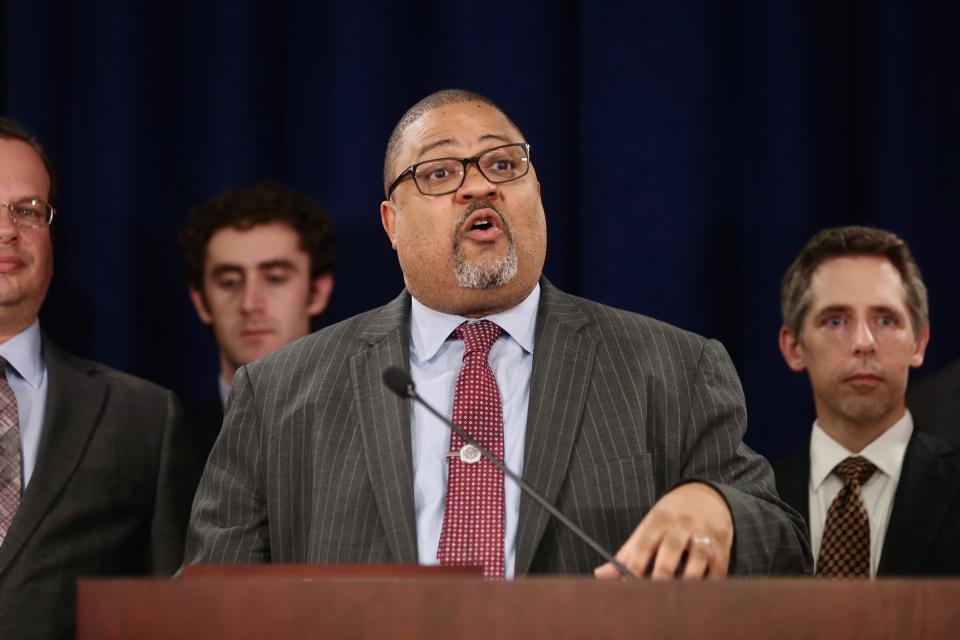Whispers, tension, suspense: What happened in court as Donald Trump heard guilty verdict
Alone: That's how Donald Trump looked after the jury foreperson declared "guilty" on 34 separate felony counts in the former president's New York criminal hush money case.
Trump wasn't physically alone.
To his right was Todd Blanche, a lawyer who laughed and smiled with his client many times throughout the more than six-week trial. To his left was Emil Bove, who conducted some of the most effective cross-examinations and would exchange quiet words with Trump at the defense table.
Behind him was his middle son, Eric, who attended more trial days than any other Trump child.
But the reality-TV-star-turned-president, who regularly scanned the audience for supporters and for the reporters he likes during the trial, didn't try to connect with anyone in the several seconds that followed. Nor did he offer a glance to the twelve jurors who had just passed judgment on him.
Instead, Trump stared blankly ahead, his expression unshakingly unhappy, as if he were taking in that he – and he alone in that courtroom – had just become a convicted felon.
The courtroom before the verdict
The reporter-dominated courtroom was filled with a quiet, steady din of typing on laptops as Judge Juan Merchan – who minutes before said he would send jurors home for the day – announced he had received a note and began to read it aloud:
"We the jury have reached a verdict. We would like an extra 30 minutes to fill out the forms. Would that be possible?" the jury said.
Blanche then whispered to Trump twice, each time raising his hand to cover his mouth as he leaned toward his client's ear.
"Please, let there be no outbursts, no reactions of any kind once we take a verdict," Merchan instructed everyone. Soon after, he exited the courtroom.
Trump sat in his chair with his arms folded. The only Trump child present, Eric, was doing something on his phone. Trump later leaned to his left for an exchange with Bove.
Manhattan District Attorney Alvin Bragg arrived, sitting down on one of the wooden benches in the audience area that was reserved for security and people accompanying the prosecution trial lawyers.

About 22 minutes after first declaring the jury had reached a verdict, Merchan re-entered and asked for the jury to be brought in. Alternate jurors were brought in first, followed by the twelve main jurors who, alone in that moment, knew Trump's fate.
"All rise!" a court officer declared.
The jurors looked somber. One of them, who took a seat in the second of two rows in the jury box, looked out at the audience and smiled. He then looked back at the judge with an expressionless face.
"Without telling me the verdict, has the jury, in fact, reached a verdict?" Merchan asked the jury foreperson.
"Yes," the man replied.
The verdict and aftermath
"How say you to the first count of the indictment, charging Donald J. Trump with the crime of falsifying business records in the first degree, guilty or not guilty?" a court clerk soon asked.
"Guilty," the foreperson said.
He would say that word 33 more times as reporters tapped furiously on laptop keys.
I had planned to message editors with my right hand while using binoculars with my left to zero in on Trump's face on courtroom screens featuring live video of his front side. (Reporters, like other spectators, sat behind the tables for defense lawyers and prosecutors and could only see their faces on the screen.) But the video feed didn't come on until just after the foreperson declared "guilty" for the 34th time.
By that time, my editors had what they needed from me. I freed both hands to zoom in on Trump's image.
There he sat, his lips closed tight in a horizontal line, staring blankly forward at no one in particular. Neither of the lawyers who flanked him tried to comfort him in that immediate aftermath. He didn't look back at his son.
If time seemed to stand still for a moment, that didn't last long. Soon, Trump was hearing the judge thank jurors for their service. They exited, with a promise from the judge that he would join them soon for some private words.
Merchan then denied a request from Blanche to toss out the verdict. Within minutes, Merchan scheduled sentencing for July 11, just four days before the start of the Republican National Convention, where Trump is expected to accept the party's presidential nomination.
"What is the current bail status?" Merchan asked. Prosecutor Joshua Steinglass said there is no bail.
"Mr. Trump remains ROR'd," Merchan said, using an abbreviation for "released on recognizance," meaning Trump could leave under an agreement to come to court when required.
Court was adjourned, and the former president – once, and perhaps soon-to-be-again, one of the most powerful people on Earth – exited, knowing he had encountered a force more powerful than his wealth or popularity, at least on that day: the law.
This article originally appeared on USA TODAY: Trump guilty verdict: What happened in court as jury revealed decision
